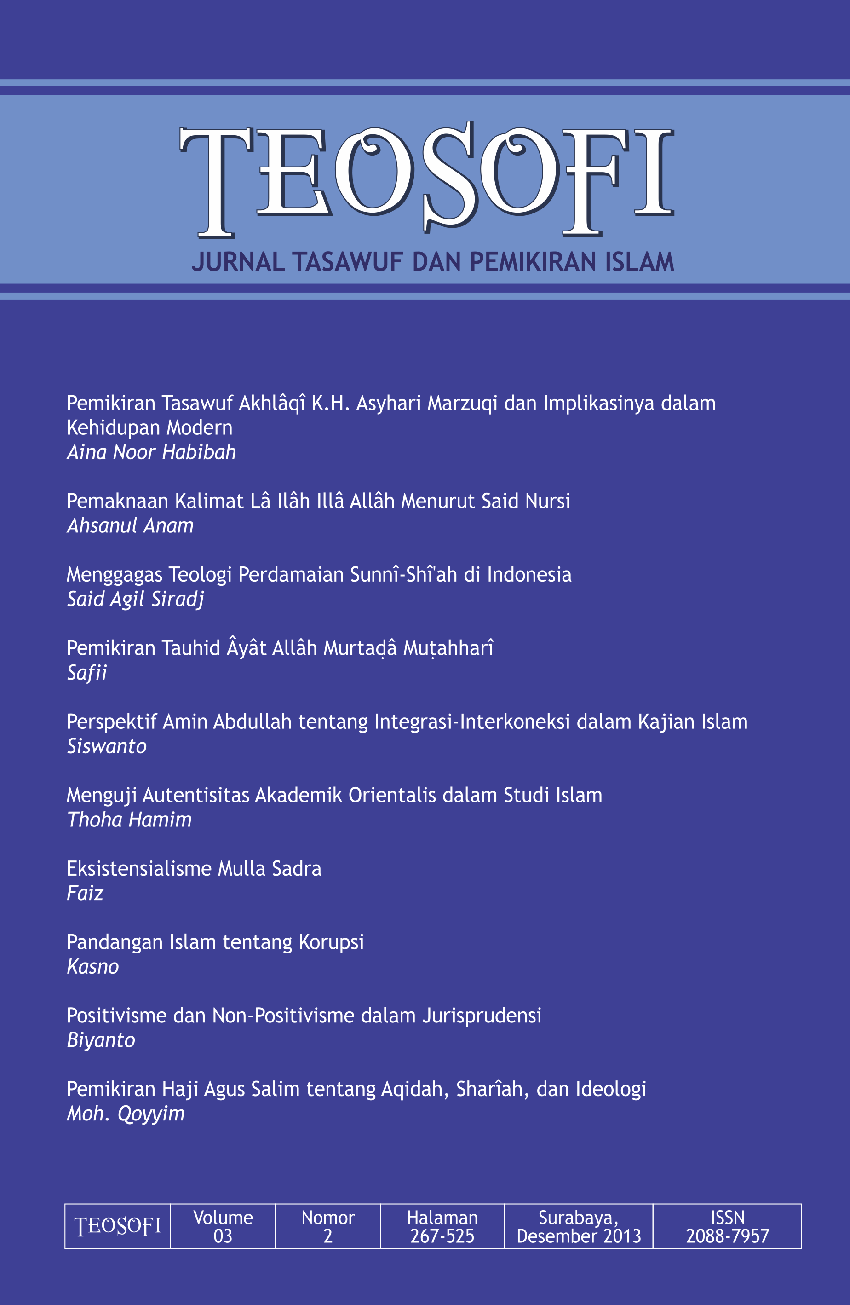Menguji Autentisitas Akademik Orientalis dalam Studi Islam
Main Article Content
Abstract
This article seeks to objectify our understanding in the term of Orientalist, in addition we test the authenticity of the studies that have been developed by the Orientalists. Critics of Orientalism is actually done by Western scholars indicate the passage of the principle of freedom of thought which underlies the research activities of academics in the West. With such academic freedom, the scholars had to deconstruct the Orientalist negative thoughts about Islam, though the thought is already crystallized into a mainstream standard. Institutional development of Islamic studies in the West in recent decades has experienced a change in orientation, to adjust to his position as a medium to establish understanding between program participants across cultural boundaries, traditions, and religion. Nevertheless, suspicion of the activities of Islamic studies in the West is carried out by Muslim students still exists as a precautionary catch against the possibility of erosion of confidence.
Downloads
Article Details
Licensing
© The Author(s). Published by Department of Aqidah and Islamic Philosophy, Faculty of Ushuluddin and Philosophy, Sunan Ampel State Islamic University Surabaya, Indonesia.
This is an Open Access article distributed under the terms of Attribution-NonCommercial 4.0 International (CC BY-NC 4.0).
References
Alghar, Hamid. “The Problems of Orientalism”, Islamic Literature, Vol. 17, 1971.
Arberry, AJ. Oriental Essays: Potrait of Seven Scholars. London: George Allen, 1968.
Arkoun, Muhammad. Rethinking Islam. Wasingthon D.C.: Center for Cotemporary Arab Studies, 1987.
‘A‘zamî, Muhammad Mustafâ. Dirâsat fî al-Hadîth al-Nabawî al-Sharîf wa Târîkh Tadwînih. Riyâd: Maktabat Riyâd, 1967.
Bijlefeld, Willem A. “A Century of Arabic and Islamic Studies at Hartford Seminary”, Muslim World, Vol. 83, 1993.
Binder, Leonard. “Area Studies: A Critical Reassessment”, dalam Leonard Binder (ed.), The Study of The Middle East Research and Scholarship in Humanities and Social Sciences. New York: John Wiley and Sons, t.th.
Buzan, Berry. “New Patterns of Global Security in the Twenty-First Century”, American Review International Affairs, July 1991.
Carr. What is History. Cambridge University of Cambridge Press, 1870.
Clifford, James. “Orientalism by Edward W. Said”, History and Theory, Vol. 19, 1980.
------. “Orientalism” dalam John L. Esposito (ed.), The Oxford Encyclopedia of the Modern Islamic World, Vol. 3. New York: Oxford University Press, 1995.
Dsodwell, Henry. The Founder of Modern Egypt: A Study of Muhammad Ali. Cambridge: Cambridge University Press, 1931.
Hodgson, Marshal G. The Venture of Islam, Vol. 1. Chicago: University of Chicago Press, 1974.
Ismael, Tariq Y. (ed.). Middle East Studies: International Perspectives on the State of The Art. London: Preager, 1990.
Jabri (al), Mohammed ‘Abed. “Clash of Civilizations”, dalam Gema Martin Munoz (ed.), Islam, Modernism, and The West. London: LB Tauris Publishers, 1999.
Jaha, Mithal. al-Dirâsah al-‘Arabîyah wa al-Islâmîyah fî Ûrubâ. Beirut: Matba‘at al-Ittihâd al-‘Arabî, t.th.
Khalifa, Muhammad. The Sublime Qur’an and Orientalism. London: Longman, 1983.
Kung, Hans. Christianity and the World Religions: Paths to Dialogue with Islam, Hinduism and Budhism. London: Doubleday, 1985.
Lewis, Bernard. “The State of Middle Eastern Studies”, The American Scholar, 1970.
Little, Donald P. “Three Arab Critiques and Orientalism”. Muslim World, 69, 1979.
Marsot, Afaf Lutfi al-Sayyid. Egypt in the Reign of Muhammad Ali. London: Cambridge University Press, 1984.
Milward, William G. “The Social Psychology of anti-Iranology”. Iranian Studies, 8, 1975.
Munoz, Gema Martin. Islam: Modernism and The West. London: JB Tauris Publisher, 1999.
Patai, Raphael. The Arab Mind. New York: Scribners, 1973.
Pruett, Gordon E. “Duncan Black Macdonald: Cristian Islamicist”, dalam Asaf Hussain et. al., Orientalism: Islam and Islamicist. Vermont: Amana Books, 1994.
Qureshi, Jamel. “Alongsideness in God Faith: An Essay on Kenneth Gragg”, dalam Assaf Hussain et. al. (ed.), Orientalism, Islam, and Islamicist. Vermont: Amana Books, 1984.
Rippin, Andrew. Muslims, Vol. 2. London: Routledge, 1990.
Rodinson, Maxim. Europe and the Mystique of Islam, terj. J.R. Veinus. Seatle Washington: University of Washington Press, 1987.
Said, Edward. Orientalism. New York: Vintage Books, 1987.
------. The Pen and the Sword: Conversion with David Barsamian. Toronto: Between the Lines, 1994.
Schaar, Stuart. “Orientalism at the Service of Imperialism”, Race and Class, Vol. 21, 1979.
Servier, Andre. Islam and the Psychology of the Musulman, terj. A.S. Moss-Bundell. London: Chapman and Hall, 1924.
Sharabi, Hisham. “The Scholary Point of View: Politics, Perspective, Paradigm”, dalam Hisham Sharabi (ed.), Theory, Politics, and The Arab World (New York: Routledge, 1990
Shukri, Abel. Israeli-Arabism: The Latest Incarnation of Orientalism. Toronto: t.p., t.th.
Smith, Wilfred Cantwell. “The Institute of Islamic Studies,” The Islamic Literature, Vol. 5, 1963.
------. Questions of Religion Truth. New York: Charles Scribner’s Sons, 1967.
Sufyânî (al), ‘Âbidîn Muhammad. al-Mustashriqûn wa Man Tabi‘ahum wa Mawqifuhum fî Thibât al-Sharî‘ah wa Shumûlihâ: Dirâsat Tatbîqîyah. Mekah: Maktabat Manârah, 1998.
Wansbrough, John. Quranic Studies: Its Genesis and Historical Interpretation. Oxford: Oxford University Press, 1997.
Watt, WM. Bell’s Introduction to the Qur’ân. Edinburgh: Edinburgh University Press, 1970.
Zaqzûq, Mahmûd Hamdî. al-Istishrâq wa al-Khalfîyah al-Fikrîyah li al-Sirâ‘ al-Hadârî. Doha: Mu’assassat al-Risâlah, 1985.

